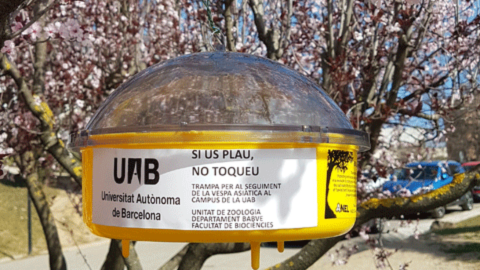New Asian wasp queen trapping campaign
The Department of Animal Biology, Plant Biology and Ecology has initiated a new campaign to detect and capture Asian wasp queens on campus. The campaign will last until the end of May.

The Zoology Unit of the Department of Animal Biology, Plant Biology and Ecology (BABVE) will develop, for the sixth consecutive year, a practical study of the Asian wasp pest on the UAB campus as part of the Animal Resources and Pest Management (GRAP) course of the third year of the Environmental Biology bachelor's degree. A group of students, led by the faculty of the course, will initiate a campaign to detect and capture queens of this species. The objective is to detect the presence of the queens and eliminate the greatest number of individuals that could give rise to new nests on campus, which will help to avoid the risks generated by their presence and proliferation in inhabited areas.
With this in mind, until the end of May a total of 90 traps will be installed throughout the campus to capture the wasp queens and minimise the appearance of new Vespa velutina nests on campus. These traps capture the Asian wasp queens and pose no risk to people, as once the wasps have entered the traps, they cannot leave them. In order to achieve the goal of the campaign, it is very important that the traps are respected and not tampered with.
The Vespa velutina queen trapping campaign last year, conducted with the students of the Environmental Biology bachelor's degree, captured and eliminated a total of 1,376 specimens. It is hoped that this removal of queens will lead to a decrease in the number of definitive Vespa velutina nests on campus.
The Asian wasp is an invasive alien species originating from Asia that was first detected in Europe in 2004, in France. Subsequently, in 2012 it was found in Galicia, northern Portugal, the Basque Country and Navarre, and that same year the first specimens were detected in Catalonia (Vall d'Aran and Alt Empordà). A year later, nests were already found in La Garrotxa, La Selva and Ripollès, thus initiating a process of expansion throughout Catalonia.
The presence of this invasive species here in Catalonia has a significant impact on beekeeping, by preying on the honey bee, but also on other pollinators of crops and wild flora. It also has effects on public health, creating a perception of insecurity in the population due to the risk of their stings.